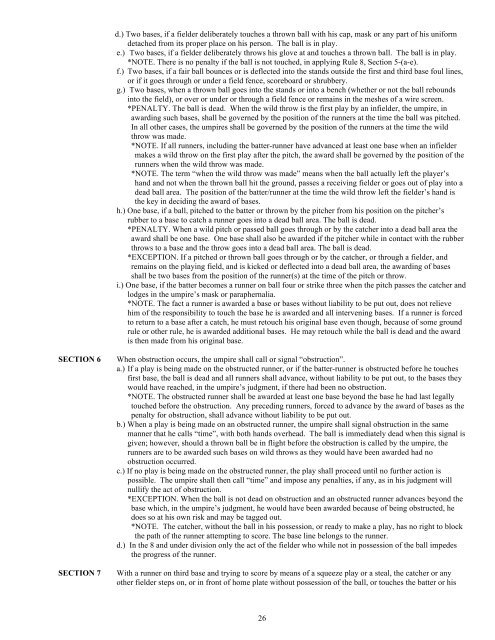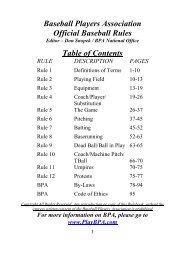baseball players association rule 1 definitions of terms
baseball players association rule 1 definitions of terms
baseball players association rule 1 definitions of terms
You also want an ePaper? Increase the reach of your titles
YUMPU automatically turns print PDFs into web optimized ePapers that Google loves.
d.) Two bases, if a fielder deliberately touches a thrown ball with his cap, mask or any part <strong>of</strong> his uniform<br />
detached from its proper place on his person. The ball is in play.<br />
e.) Two bases, if a fielder deliberately throws his glove at and touches a thrown ball. The ball is in play.<br />
*NOTE. There is no penalty if the ball is not touched, in applying Rule 8, Section 5-(a-e).<br />
f.) Two bases, if a fair ball bounces or is deflected into the stands outside the first and third base foul lines,<br />
or if it goes through or under a field fence, scoreboard or shrubbery.<br />
g.) Two bases, when a thrown ball goes into the stands or into a bench (whether or not the ball rebounds<br />
into the field), or over or under or through a field fence or remains in the meshes <strong>of</strong> a wire screen.<br />
*PENALTY. The ball is dead. When the wild throw is the first play by an infielder, the umpire, in<br />
awarding such bases, shall be governed by the position <strong>of</strong> the runners at the time the ball was pitched.<br />
In all other cases, the umpires shall be governed by the position <strong>of</strong> the runners at the time the wild<br />
throw was made.<br />
*NOTE. If all runners, including the batter-runner have advanced at least one base when an infielder<br />
makes a wild throw on the first play after the pitch, the award shall be governed by the position <strong>of</strong> the<br />
runners when the wild throw was made.<br />
*NOTE. The term “when the wild throw was made” means when the ball actually left the player’s<br />
hand and not when the thrown ball hit the ground, passes a receiving fielder or goes out <strong>of</strong> play into a<br />
dead ball area. The position <strong>of</strong> the batter/runner at the time the wild throw left the fielder’s hand is<br />
the key in deciding the award <strong>of</strong> bases.<br />
h.) One base, if a ball, pitched to the batter or thrown by the pitcher from his position on the pitcher’s<br />
rubber to a base to catch a runner goes into a dead ball area. The ball is dead.<br />
*PENALTY. When a wild pitch or passed ball goes through or by the catcher into a dead ball area the<br />
award shall be one base. One base shall also be awarded if the pitcher while in contact with the rubber<br />
throws to a base and the throw goes into a dead ball area. The ball is dead.<br />
*EXCEPTION. If a pitched or thrown ball goes through or by the catcher, or through a fielder, and<br />
remains on the playing field, and is kicked or deflected into a dead ball area, the awarding <strong>of</strong> bases<br />
shall be two bases from the position <strong>of</strong> the runner(s) at the time <strong>of</strong> the pitch or throw.<br />
i.) One base, if the batter becomes a runner on ball four or strike three when the pitch passes the catcher and<br />
lodges in the umpire’s mask or paraphernalia.<br />
*NOTE. The fact a runner is awarded a base or bases without liability to be put out, does not relieve<br />
him <strong>of</strong> the responsibility to touch the base he is awarded and all intervening bases. If a runner is forced<br />
to return to a base after a catch, he must retouch his original base even though, because <strong>of</strong> some ground<br />
<strong>rule</strong> or other <strong>rule</strong>, he is awarded additional bases. He may retouch while the ball is dead and the award<br />
is then made from his original base.<br />
SECTION 6<br />
SECTION 7<br />
When obstruction occurs, the umpire shall call or signal “obstruction”.<br />
a.) If a play is being made on the obstructed runner, or if the batter-runner is obstructed before he touches<br />
first base, the ball is dead and all runners shall advance, without liability to be put out, to the bases they<br />
would have reached, in the umpire’s judgment, if there had been no obstruction.<br />
*NOTE. The obstructed runner shall be awarded at least one base beyond the base he had last legally<br />
touched before the obstruction. Any preceding runners, forced to advance by the award <strong>of</strong> bases as the<br />
penalty for obstruction, shall advance without liability to be put out.<br />
b.) When a play is being made on an obstructed runner, the umpire shall signal obstruction in the same<br />
manner that he calls “time”, with both hands overhead. The ball is immediately dead when this signal is<br />
given; however, should a thrown ball be in flight before the obstruction is called by the umpire, the<br />
runners are to be awarded such bases on wild throws as they would have been awarded had no<br />
obstruction occurred.<br />
c.) If no play is being made on the obstructed runner, the play shall proceed until no further action is<br />
possible. The umpire shall then call “time” and impose any penalties, if any, as in his judgment will<br />
nullify the act <strong>of</strong> obstruction.<br />
*EXCEPTION. When the ball is not dead on obstruction and an obstructed runner advances beyond the<br />
base which, in the umpire’s judgment, he would have been awarded because <strong>of</strong> being obstructed, he<br />
does so at his own risk and may be tagged out.<br />
*NOTE. The catcher, without the ball in his possession, or ready to make a play, has no right to block<br />
the path <strong>of</strong> the runner attempting to score. The base line belongs to the runner.<br />
d.) In the 8 and under division only the act <strong>of</strong> the fielder who while not in possession <strong>of</strong> the ball impedes<br />
the progress <strong>of</strong> the runner.<br />
With a runner on third base and trying to score by means <strong>of</strong> a squeeze play or a steal, the catcher or any<br />
other fielder steps on, or in front <strong>of</strong> home plate without possession <strong>of</strong> the ball, or touches the batter or his<br />
26



